We have been actively
Selling Singer Featherweight Model 221 and 222 Portable
Electric Sewing Machines
online for over 25 years!
Click here to read some of our testimonials!
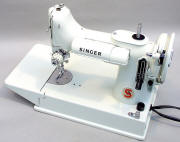
We
buy and sell Black, White, and Tan Singer 221 Sewing Machines,
as well as Singer 222 Freearm
Sewing Machines. We are especially interested in purchasing San Francisco "Golden Gate Exposition", Chicago World's Fair "Century
of Progress", and "Texas Centennial" Singer Featherweight 221 Sewing
Machines. We also purchase Blackside / Black Oxide
Finish and
WWII Era Crinkle Finish Featherweight
Sewing Machines.
If you have
a Featherweight you would like to sell please
email me at
ilovefeatherweights@gmail.com
Important Information:
About Singer Featherweight Sewing Machines,
Their Value, and Selling Yours
Here are some
frequently asked questions we get about Singer 221
and 222 Featherweight sewing machines:
How old is my Singer Featherweight
sewing machine?
We often get the question, "How do I find the date my
Featherweight was born?" To date your Featherweight look on the bottom
of the machine to find the serial
number. Every machine has a unique serial number which will
begin with two letters followed by six numbers. Singer kept
records for their production runs, and there are numerous websites you can
find online to learn when the serial number for your
Featherweight was assigned. Simply match up the serial number on your
machine with the corresponding day, month and year on the chart. People often refer to this
as the date the machine was "born", but more accurately it is the
date the production run for that series of machines was assigned.
Each production run would have included multiple thousands of that
model machine slated to be manufactured. Therefore the machines
with serial numbers assigned for any production run would have come off the
manufacturing line sometime
between that date and the date of the next production series
assignment.
Are Featherweights that were
manufactured in certain years more desirable than others?
People often wonder, "Are certain Featherweights better or more
valuable than others?" Featherweights were made from the 1930's through the 1960's. Although the basic design of the machine remained the same
throughout the entire period of production there are certain
variations that can make a difference in value and / or
desirability. Featherweight buyers are sometimes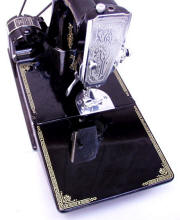 attracted to
a machine that was manufactured in the year that corresponds to the
year they were born, or married, or a date that matches some other
meaningful event in their life. Some seek out
Featherweights that were manufactured during the earliest years of
production, while others want one from the final years. Many
Featherweight buyers become Featherweight collectors and eventually want
Featherweights from several different years or time periods.
attracted to
a machine that was manufactured in the year that corresponds to the
year they were born, or married, or a date that matches some other
meaningful event in their life. Some seek out
Featherweights that were manufactured during the earliest years of
production, while others want one from the final years. Many
Featherweight buyers become Featherweight collectors and eventually want
Featherweights from several different years or time periods.
Most Featherweights were painted shiny black, but during the 1960's Singer
manufactured Featherweights in beige-y tan and white / pale green
colors. To celebrate their 100 year anniversary Singer branded
a relatively small number of machines manufactured during 1950 and
1951 with a special logo to commemorate this, and these
Featherweights are referred
to as "Centennials". Any of these variations can make those
machines a bit more "collectible" to some buyers.
But by far the most significant variations---the ones that affect value the
most---are what are referred to as the "Expo" models. This
would be those machines associated with the 1934 "Century of
Progress / Chicago World's Fair", the 1936 "Texas Centennial", and
the 1939 "Golden Gate Exposition". For each of these events,
and on just a very limited number of machines, Singer replaced the
regular Singer medallion that is riveted to the front of the arm
with a special medallion to commemorate that exposition.
Other important variations that can affect the value of a Featherweight
are those machines manufactured in 1939-40 with "crinkle finish"
paint (sometimes referred to as "wrinkle" or "Godzilla" finish) and
those Featherweights referred to as "Blacksides", which were produced
during the years of World War II with anodized black metal parts.
What is the difference
between a Model 221 and a Model 222 Featherweight?
 Sometimes
we get asked the question, "How do I know if my Featherweight is a
model 221 or 222"? Singer Featherweight Model 222 sewing machines, also
known as "Freearm" or "Convertible" Singer Featherweights, had a feature
that was not found on the Featherweight Model 221 machines. The Freearm Featherweights were designed with a tubular bed feature that
allows a portion of the flat bed or base to be removed to make a narrow
neck under the needlebar area so you could sew
around sleeve cuffs, pant legs, and other areas with limited access. The Model 222 Featherweight
machines also have a feature that allows you to drop the feed dogs to enable
machine darning and free-motion embroidery. The freearm 222
Featherweights were only produced in Singer's UK factories---there
were no Singer 222s produced in Singer's US factories. Those
slated to be sold in Europe were equipped with 220 voltage motors.
Those slated for export to the US were given 110 voltage motors. There were relatively few
model
222 Featherweights produced compared to the number of Featherweight
model 221 machines,
and they were more expensive to begin with, so the Singer 222's generally command considerably higher prices
than 221s.
Sometimes
we get asked the question, "How do I know if my Featherweight is a
model 221 or 222"? Singer Featherweight Model 222 sewing machines, also
known as "Freearm" or "Convertible" Singer Featherweights, had a feature
that was not found on the Featherweight Model 221 machines. The Freearm Featherweights were designed with a tubular bed feature that
allows a portion of the flat bed or base to be removed to make a narrow
neck under the needlebar area so you could sew
around sleeve cuffs, pant legs, and other areas with limited access. The Model 222 Featherweight
machines also have a feature that allows you to drop the feed dogs to enable
machine darning and free-motion embroidery. The freearm 222
Featherweights were only produced in Singer's UK factories---there
were no Singer 222s produced in Singer's US factories. Those
slated to be sold in Europe were equipped with 220 voltage motors.
Those slated for export to the US were given 110 voltage motors. There were relatively few
model
222 Featherweights produced compared to the number of Featherweight
model 221 machines,
and they were more expensive to begin with, so the Singer 222's generally command considerably higher prices
than 221s.
What is my Singer Featherweight
sewing machine "worth"?
By far the most frequent question we get asked is, "How
much is my Featherweight worth?". There is no simple answer to that question! What most people who
ask that question really want to know is, "What will it sell for?" And
the answer to that is, it all depends. It depends on whether it's a standard 221 or one of the
more unusual variations. But it also depends on who you are selling
it to, on where you are selling it and how wide your pool of
potential buyers is, on your reputation as a seller,
on how you present the machine, and on how quickly you want it to
sell.
Beyond that, the
three most important factors that determine how much a vintage /
antique Singer 221 or 222 Featherweight sewing machine is "worth"
are:
1) Condition 2) Condition and 3) Condition
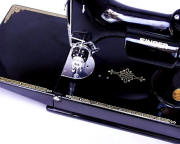 How
your Singer 221 or 222 sewing machine looks cosmetically is as important
to its resale value as anything else. Nearly all 221 and 222
Singer Featherweights
sew well or, with minor "tune ups", can be adjusted to sew well. Singer 221and 222 Featherweights are very reliable and very straightforward to
maintain. You
can actually work on them. You can replace parts. They
are not computerized or complicated. They were made use, to
pass on, and to last several lifetimes!
How
your Singer 221 or 222 sewing machine looks cosmetically is as important
to its resale value as anything else. Nearly all 221 and 222
Singer Featherweights
sew well or, with minor "tune ups", can be adjusted to sew well. Singer 221and 222 Featherweights are very reliable and very straightforward to
maintain. You
can actually work on them. You can replace parts. They
are not computerized or complicated. They were made use, to
pass on, and to last several lifetimes!
The real indicator of value isn't whether your sewing machine "still
sews". That it sews is almost a given. The real
question is how well it sews, or what needs to be "tweeked"
or adjusted or
cleaned to make it sew better. The other important
question is "How good does it look?" In my opinion the phrase "It looks good given
its age" doesn't cut it when it comes to Singer Featherweight 221
or 222 sewing machines. To command top value / top sales price a Singer 221 or 222 sewing
machine needs to look great "in spite of" its age.
Why do so many quilters want a Singer Featherweight?
You might be asking, "What is it about these
Featherweights that makes them so popular?"
There are numerous reasons! Quilting is a popular hobby and
Featherweights are beloved by any quilter who has ever used one.
Featherweights are revered for their straight stitch perfection and
ability to sew that precise 1/4" seam required for quilting
piecework. The reason for what has come to be known as the
perfect Featherweight stitch is simple---unlike on modern machines
the bobbin on a Featherweight is positioned vertically and parallel
to the needlebar, where it rotates in line with the direction /
orientation of the seam. Compare that to most modern sewing
machines, where the bobbin is located horizontally in front of the
needlebar, and perpendicular to the direction of the seam.
Because of this orientation the bobbin thread on a Featherweight
does not get tugged sideways and slightly askew as it does on a modern machine as
the stitch is formed, and the straight stitch is actually
straight---with the front of the last stitch directly in line with
the back of the next stitch.
If you still need another reason
or two or three to buy a Featherweight: 1) They are
lightweight, compact, and portable. 2) The carry case
makes them convenient to store when not in use, and easy to tote to
classes and gatherings. 3) They are extremely reliable,
not difficult to use, and easy to maintain. 4) They have
attachments and accessories that make them fun to use for garment
making and crafting / creating. 5) They are so very
cute!!
What are the benefits of
consigning my Featherweight for you to sell?
Consigning makes sense if you have a Featherweight that is one of
the desirable variations, for example one of the unusual variations
listed above. We can achieve the highest value for these unusual
sewing machines, and we make
the entire process very easy for you. After I've evaluated
your machine from your pictures and determined that it's suitable to be sold from our
website I will send you instructions for packing and shipping.
Upon receiving your machine I give it a complete servicing and
a thorough cleaning and detailing to prepare it for sale. My service includes providing
the eventual buyer with a 1-year guarantee on the machine. So
it's a win-win-win situation. The purchaser buys with
confidence. You, the seller, get top value. I collect my
commission from the proceeds of the sale, and I get to sell
some of the nicest examples of the finest sewing machines ever made!
What are the benefits of
selling my Featherweight outright to you as opposed to consigning?
If you don't want to wait for an eventual sale to the end-buyer
it might make sense to sell your machine to me outright. If
your circumstances are such that getting paid quickly is more
important to you than holding out for the highest possible price,
then an outright sale might be more beneficial. If your
expectations are reasonable I can accommodate you either way.
What do you look for in evaluating
a 221 / 222 Featherweight?
If you have a Singer Featherweight 221 or 222 you would like to sell
or consign
I'm going to ask you to send several pictures to show me the
details of its cosmetic condition. In evaluating your machine
I will look at the amount of wear or thinning to the gold decoration,
particularly along the front edge at the "fabric path". I will try to assess the degree of shine, or lack of, to the black paint, and the amount of
scratches or "pin marks" on the surface. I'll look
closely to see whether the clearcoat finish is pealing, uneven or
blotchy. The clearer your pictures the more accurate I can be
with my evaluation. I'll also ask you to open
the lid and tell me honestly whether the carry case has a musty smell. All of those factors play into the value and desirability.
The most typical cosmetic "issue" you see on a Singer Featherweight
is wearing away of the gold decal decoration that runs around the perimeter
of the flat table portion, particularly in front of and to the left
and right of the needlebar area. This is known as "fabric path"
wear and is a result of the fabric running past the front edge of the
sewing machine over and over again as it moves along through the needle. Another common cause of this wear to the gold decoration is from the
seamstress repeatedly placing his / her hands in one position on the
front edge of the machine, year after year, garment after garment.
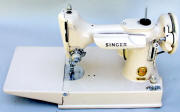 Most people's first impulse is to say that their Singer 221 machine "is
in great condition" but what you think is "great" might be what I think
is only "fair". It's like the bad driver analogy---I have never
heard anyone describe themselves as a bad driver, but let's face it,
there are lots of bad drivers around! There are likewise lots of
just so-so looking Singer Featherweights around. There were
over 2 million of them made, and a lot of them got used, and used,
and used, so you need to look at yours
with a critical eye when describing it to me. With Featherweights
(as with all antiques) it's the little details of condition that make
the big differences in value.
Most people's first impulse is to say that their Singer 221 machine "is
in great condition" but what you think is "great" might be what I think
is only "fair". It's like the bad driver analogy---I have never
heard anyone describe themselves as a bad driver, but let's face it,
there are lots of bad drivers around! There are likewise lots of
just so-so looking Singer Featherweights around. There were
over 2 million of them made, and a lot of them got used, and used,
and used, so you need to look at yours
with a critical eye when describing it to me. With Featherweights
(as with all antiques) it's the little details of condition that make
the big differences in value.
Do these cosmetic issues affect the use or function of the machine? Of course
they don't, but they do affect the value to the extent that they may
indirectly point to more or less prior use of the machine. But
more importantly they detract from the "collector value", and many Featherweight
fanatics buy Singer 221's and 222's as much for their "display" and
collector value as for their "user" value.
My Featherweight case smells awful---is that a deal breaker?
There shouldn't be an offensive odor if the machine and carry
case have been stored in a clean dry indoor location. That
dreaded awful
smell rears its ugly head when a Featherweight has been stored in a
damp location, like a basement, garage, barn, non-climate controlled
storage unit, etc. Depending on the severity the smell can be
near impossible to eliminate, and most Featherweight buyers, or at
least those that are willing to pay good money for them, find it
totally unacceptable. Because I sell Featherweights online I
have to be not just the eyes, but also the nose, of my potential
customers. So in general I steer clear of those that have
musty, moldy odors. Exceptions, of course, are made for those
extremely rare variations of the machines as discussed above.
Here's the view
of your Featherweight I need to see if you are sending me pictures:
Click on the small picture below to see the size and detail I am looking for.
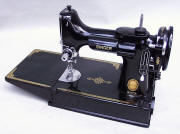
If you plan to sell me your Black Singer
Featherweight I need to be able to clearly see that
gold decal that runs around the perimeter of the base to assess its condition.
I need to see the same view of your White and Tan Singer
Featherweight.
If you have
a Featherweight you would like to sell please
email me at
ilovefeatherweights@gmail.com
To view examples of vintage
Singer Featherweight 221 and 222 sewing machines we have previously
sold and are always interested in buying from or selling for you on
consignment be sure to visit our Featherweight
Sewing Machine
Past Sales Archive Pages.
To view the Singer Featherweights
we are currently offering for sale, please see our
Featherweight Sales Page.
* * * * We Buy & Sell Antiques!
* * * *
If you have a single antique or a collection of antiques to sell
please contact Patented-Antiques.com at patentedantiques@gmail.com.
Give us some specifics about what you have
and pictures, if possible, and we will get back to you ASAP..
To view examples of the types of antiques and collectibles we have previously
sold and are always interested in helping you sell please visit our
Past
Sales Archive Pages at our sister website
www.AntiqBuyer.com.
Thanks!!
Larry & Carole